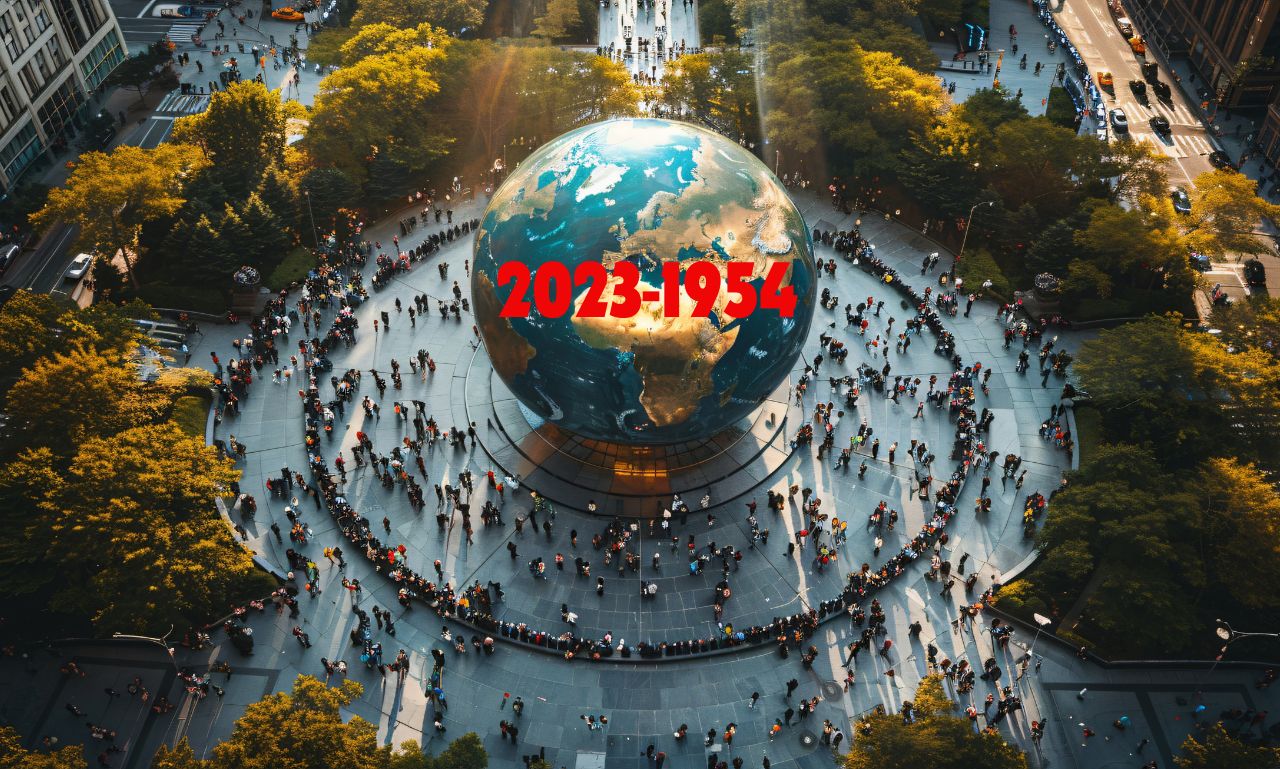Step into the time machine with me as we journey back to the transformative years between 1954 and 2023. These decades were not just pages in a history book but chapters that sculpted the world we inhabit today. From political tensions to social revolutions, technological breakthroughs to independence movements, these years were a melting pot of change and progress that continues to resonate through our current global landscape. Let’s delve deeper into how the events of 1954-2023 have left an indelible mark on our world today.
The Cold War and its impact on global politics
The Cold War, spanning from 1947 to 1991, was a pivotal period in global politics. It marked the ideological struggle between the United States and the Soviet Union, shaping international relations for decades. Tensions ran high as both superpowers engaged in a nuclear arms race and competed for influence around the world.
From proxy wars in Korea and Vietnam to the Cuban Missile Crisis, the Cold War brought about significant geopolitical shifts. The division of Europe into East and West symbolized the broader conflict between capitalism and communism. The formation of military alliances like NATO and the Warsaw Pact further intensified this rivalry.
The impact of the Cold War extended beyond just political boundaries; it influenced cultural trends, technological advancements, and economic policies worldwide. Its legacy continues to resonate in contemporary geopolitics, reminding us of how historical events can shape our present reality.
Civil Rights Movement in the United States
The Civil Rights Movement in the United States from 1954 to 2023 was a pivotal time in history. It was a period marked by courage, resilience, and determination as individuals fought against racial segregation and discrimination.
Leaders like Martin Luther King Jr., Rosa Parks, and Malcolm X emerged as beacons of hope for equality and justice. Their efforts paved the way for significant changes in legislation, such as the Civil Rights Act of 1964 and the Voting Rights Act of 1965.
Protests, marches, sit-ins, and boycotts became common forms of nonviolent resistance used to challenge oppressive systems. The movement sparked conversations about race relations that continue today.
Despite progress made during this era, challenges persist. Issues surrounding systemic racism, police brutality, and inequality remind us that the fight for civil rights is ongoing.
Decolonization in Asia and Africa
Decolonization in Asia and Africa marked a significant shift in global power dynamics. During the period of 2023-1954, numerous countries in these regions fought for independence from colonial rule. The struggle for self-determination sparked movements led by inspirational figures like Mahatma Gandhi and Kwame Nkrumah.
The decolonization process was not without challenges; it often entailed political instability and social unrest as new nations sought to establish their identities. However, the drive for autonomy prevailed as these nations reclaimed their sovereignty.
The legacy of decolonization continues to shape international relations today, influencing diplomatic alliances and economic policies. It serves as a reminder of the importance of respecting diverse cultures and promoting equality on a global scale.
As we reflect on this pivotal period in history, we are reminded that the fight for freedom is ongoing. Decolonization remains a beacon of hope for those striving to create a more just and equitable world.
Technological advancements during this period
Technology during the period of 2023-1954 witnessed remarkable advancements that laid the foundation for the digital era we live in today. The development of computers, starting with room-sized machines to compact personal devices, revolutionized how information is processed and shared globally.
The invention of transistors in the late 1940s led to the creation of smaller and more efficient electronic devices, paving the way for modern electronics. The launch of Sputnik by the Soviet Union in 1957 not only marked the beginning of space exploration but also spurred technological innovation in communications and satellite technology.
Moreover, breakthroughs like the discovery of DNA structure by Watson and Crick in 1953 set off a chain reaction leading to significant advancements in genetics and biotechnology. These technological milestones from 2023-1954 continue to shape our world today, influencing fields such as artificial intelligence, nanotechnology, and telecommunications exponentially.
Influence of these events on current world affairs
The events of 2023-1954, such as the Cold War, Civil Rights Movement, decolonization in Asia and Africa, and technological advancements, have left a lasting impact on current world affairs. The tensions and power struggles during the Cold War era continue to shape global politics today. The fight for civil rights in the United States set a precedent for social justice movements worldwide.
Decolonization efforts have led to the emergence of independent nations that play crucial roles in international relations. Technological advancements from this period laid the foundation for our modern interconnected world, influencing how we communicate, work, and live our lives.
These events have taught us valuable lessons about diplomacy, equality, freedom, and progress. By understanding their influence on current world affairs, we can navigate challenges more effectively and strive towards a more peaceful and equitable future.
Lessons learned from the past for shaping the future
As we reflect on the events that unfolded between 2023 and 1954, one undeniable truth emerges – history serves as a teacher for shaping our future. The Cold War taught us the dangers of ideological conflicts and highlighted the importance of diplomacy in maintaining global peace. The Civil Rights Movement showed us the power of collective action in combating systemic injustices and fostering equality.
Decolonization movements in Asia and Africa demonstrated the significance of self-determination and sovereignty for nations seeking independence from colonial powers. Technological advancements showcased how innovation can revolutionize societies, connecting people across borders like never before.
These lessons from the past urge us to prioritize cooperation over confrontation, justice over oppression, autonomy over subjugation, and progress over stagnation. By learning from history’s triumphs and failures, we equip ourselves with valuable insights to navigate present challenges and strive for a brighter tomorrow.
Conclusion
In reflecting on the significant events that unfolded between 2023 and 1954, it becomes evident that this period has indelibly shaped the world we live in today. The Cold War set the stage for global power dynamics, the Civil Rights Movement in the United States fought for equality and justice, decolonization paved the way for independence in Asia and Africa, while technological advancements revolutionized how we communicate and interact.
The lessons learned from these events are profound. They teach us about resilience, perseverance, and the power of unity in overcoming adversity. As we navigate current world affairs, it is crucial to remember our history—both its triumphs and its mistakes – to guide us towards a future built on progress, equality, and peace.
By understanding how events from 2023-1954 have influenced our present reality, we can work towards creating a better tomorrow for generations to come.





